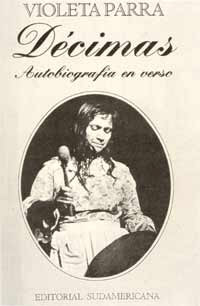
Violeta
Parra
Photo
Copyright © Música Popular Chilena – 20
Años 1970-1990 Edited by Alvaro Godoy and Juan Pablo
González |
When
my father and I were taken, my mother, who was always a mother,
a protector (politics are irrelevant to her), did what all women
did: she talked to officials, colonels, lieutenants, military people,
taking advantage of a certain radius of influence she had and personal
acquaintances to get us out. My father was released almost immediately
after a couple of her interventions, a few of her telephone calls.
They left me inside, which is how it should have been.
After many negotiations I was finally released. One thing in my
favor was my age. I wasn’t of age yet. And to a lesser degree,
the kind of relationships my father had with people of the Right
and the military. Third, the few political offenses I had on my
record. And fourth, maybe it was a star that protected the poet.
After I got out of prison, I had to go to work because my father
died shortly after the coup. He had been ill, but I think the prison
experience affected him psychologically. From the time he was released
in September until January, when he died, he was depressed. I went
to the hospital to see him a few days before he died.
As
I remember it now, that was a powerful experience. They gave me
permission to see him, with two soldiers armed to the teeth. And
then when he died, they allowed me to visit the house and the wake.
I went with a soldier, who didn’t leave me even when I went
to the bathroom. He was very young and was just performing his duty.
I promised him that I wasn’t going to try to escape and that
I intended to stay until they buried my father. He left. I also
talked to the commander of the regiment and asked him please not
to send a soldier with me the following day when they were going
to bury my father, and again promised not to escape. With difficulty,
the commander said, "I’ll look into it," or something
like that, "Alright," he said, "but when it’s
over I’ll be waiting for you myself at the entrance of the
cemetery."
In spite of the pain of the circumstances of my father’s death,
there was also a strange feeling of being free -- to participate
in everything, go to the cemetery, participate in the funeral ritual.
When it was over, and we were leaving the gates of the cemetery,
there across the street was the commander. Seeing him there was
more horrible than all that had gone before. It’s wrenching
to be forced to interrupt a familial process. I should have replaced
my father right then and there as the financial support of the household,
but I couldn’t. I had to go back to jail.
That moment was the worst. More than the situation itself, what
devastated me the most was not being able to go home and perform
my duty as head of the family, not being of any use to the people
who needed me so. I wished I could have done what Shostakovich was
able to do in his Seventh Symphony: transcend the prison walls to
reach those who were able to listen with a message of resistance
and hope.
|
|


